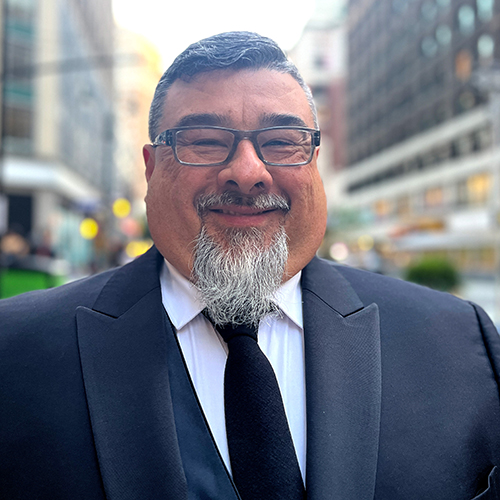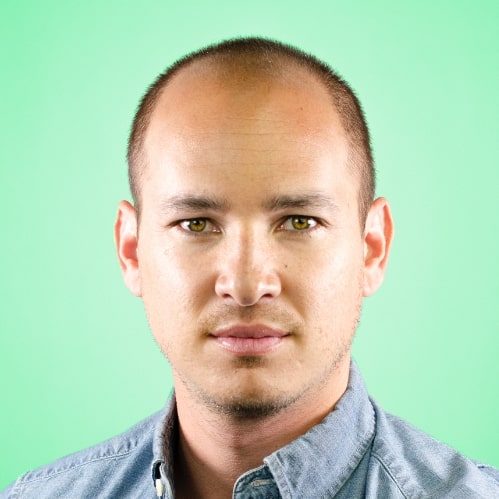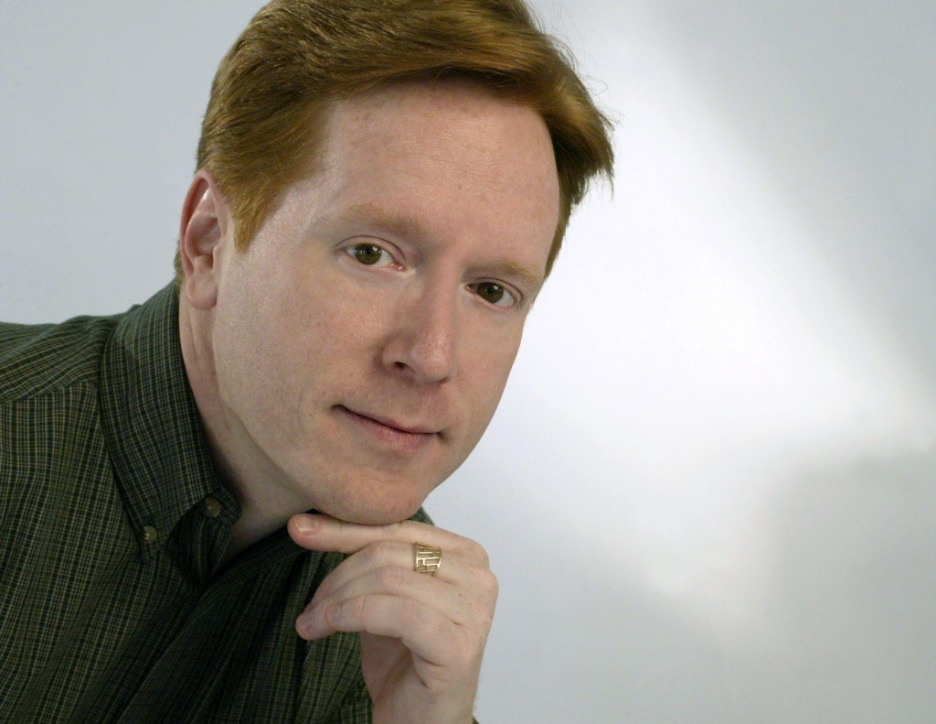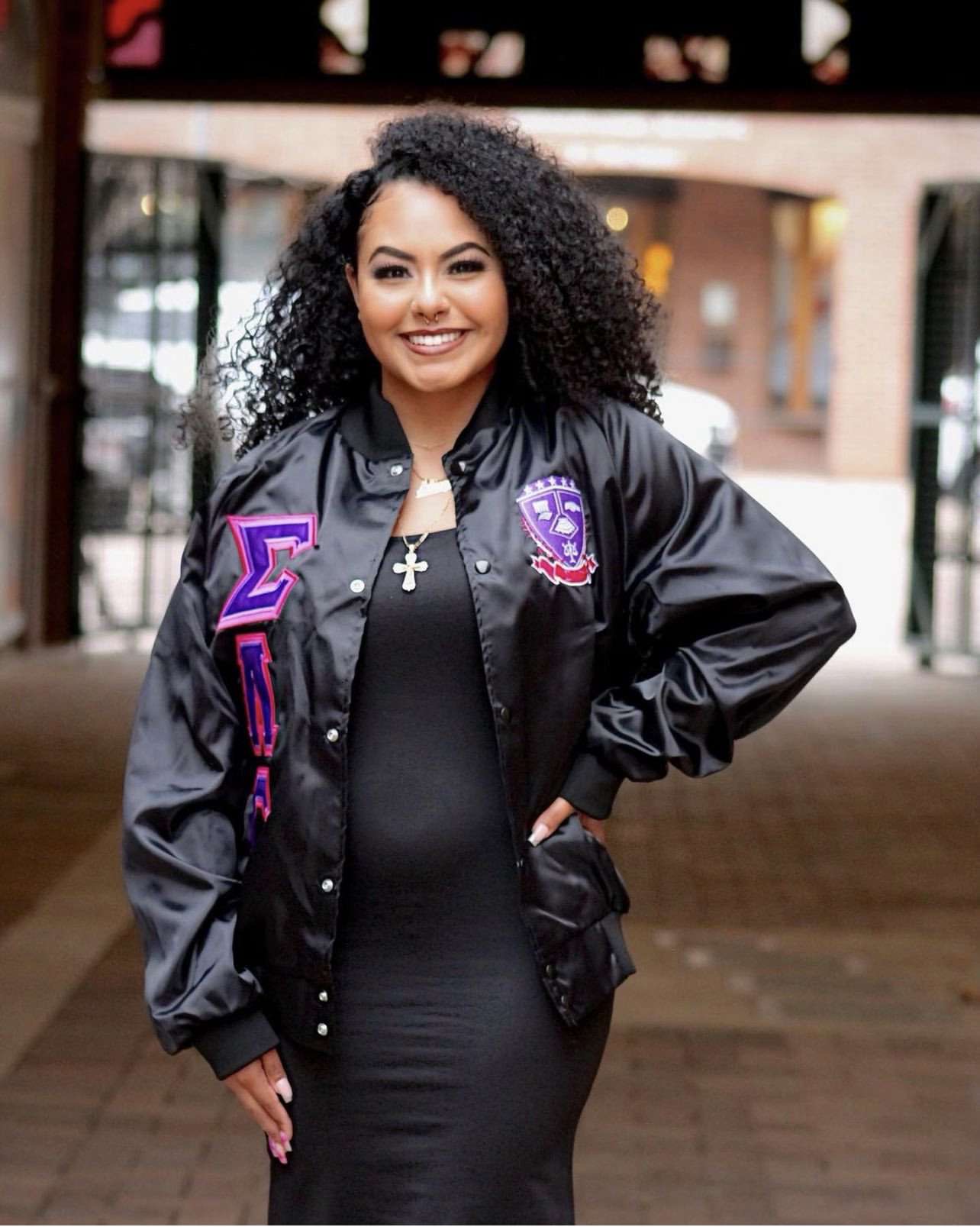
Shawn Montano, an assistant professor in UNC’s Journalism and Media Studies program with 25 years of industry experience, talks about his transition into teaching and how his students are gaining valuable hands-on experience in digital storytelling, news production and podcasting. (Run time: 6:30)
Transcript:
My name is Shawn Montano and I am a journalism professor in the Journalism and Media Studies program.
Shawn had been making waves in the journalism community in Denver before he made the transition to teaching at Front Range Community College in 2009. For this episode of Bear in Mind, he sat down with me to talk about his history in journalism and teaching how he is trying to make the classroom more like a real life journalistic experience for students and his work reviving the Bear in Mind podcast.
What's your history with, like, making packages and the news in general?
Well, I have 25 years plus of broadcast experience. I'm pretty sure that I can say this because I have no one thing to say. This is not true. I'm the only person that has worked at all five television stations in Denver, so I've worked at Channel two, Channel four, Channel Seven, Channel Nine and Channel 31. No one can say that anymore because Channel two and Channel 31 have merged.
So that's in one building. So nobody can say that they've worked at all five major television stations. So that's like my little claim to fame. I was a video editor for most of my career in news. I also produced documentaries, also produced shows. I also shot stories, edited a narrated film. Primarily. I was a news editor in my the beginning of the career and then obviously did more.
What made you want to transition from that to teaching?
I got burned out. I love news. I mean, when I, I remember to this day, the very first time I had a VO/SOT so.
Unless you're in the journalism world, I'm not really expecting you to know what a VO/SOT is. So a VO/SOT is an abbreviation that stands for voice over sound on tape.
On the air. I was so excited. After I edited it, I ran up to the control room and I watched them air the VO/SOT on there, like, What's this guy doing? I was like, This is awesome. My work is on TV isn't awesome. And that adrenaline and that drive was just always in me. But as you know, as I neared the end of my career in a broadcast newsroom, I just didn't have that passion anymore.
And I was that wasn't fair to the product, that wasn't fair to my colleagues, that I wasn't there. I wasn't, like, passionate. So I was like, okay, I need to transition out of news. And that's when I started to become a teacher. Before I came to you UNC, I was a professor at Emily Griffith Technical College in Denver, Colorado.
I ran the video production program there.
Why did you choose UNC to come to?
There was an opening. I taught digital storytelling, which is how to create a news package. I also do a little bit of Photoshop and a little bit of after effects. So that's the class that I created for this program that I still teach today. When I saw the opening at UNC, I looked at all of the what they wanted for this professor, and I'm like, That's me.
And very unhumbling I was like, There is no one else in Colorado that's more qualified to do this job than me. I was very confident. I had all of the qualifications, broadcast stills, package skills, news writing. I had all of that. I was like, This is this is my perfect job. If I wrote a job description of what I want, that is it.
And so I applied and they saw what I had. And here I am.
So what classes do you teach at UNC?
Currently, this semester I teach intro to video production, which is this class where students kind of get an idea of how to do a newscast. It's the first time they're in the studio. They also do an intro to podcasting. So it's kind of an introduction to the broadcast side. I also teach news production class, which is Bear news.
So students put to newscasts together each week. And so they are reporters that are photojournalists, that are video journalists, technical directors, producers. They do everything that you would do in a news broadcast station. The class that I introduced into the program was digital storytelling. Okay, so the first gear that I taught here, the chair was Dr. Edwards, and he said, What are students lacking?
And I said, Your students are lacking package producing understanding. And he said, Would you create a class? And I said, Yes.
A package is, as Google says, a self-contained taped news report, basically meaning that it is a prerecorded story where the reporter writes edits and fronts it. How do you implement your previous experiences into teaching students?
So when I took over Bear News, that's the news production class. I wanted to make it as as accurate of a actual broadcast environment as possible. So, you know, I call it experiential learning. So there's no lectures. We don't. Okay, here's a lecture on how to write. No, I have people do stuff. I have them do it. And then after they do it, I give them a very valuable critique on their work and so that they can prove but there's no like grade tied to it.
So you don't get an A for this. You don't get a D. I just I give you the points and I give you feedback because in a real world environment you don't get graded, but you have very valuable feedback on how to improve. So I brought that kind of environment and I want students can like feel real world deadlines, like one of our students just a few weeks ago was editing a story up to the deadline.
I mean, she finished it at like 12:50 and like 5 minutes later it aired on our newscast. It's really hard to do that in a college environment because, you know, if this was real, you would have to turn to stories a day every day of the week. Right. Why can't have you do that? Because you have these other classes.
News production is a required class for seniors. Do you know what it was like beforehand, like before you started teaching it?
So, Doctor E. taught it. I mean, he was somewhat similar, but he graded stuff, but he only did like one newscast a week. And usually like the first day was lecture based and he taught stuff. And then the final day was actually the production. That's kind of how he taught it. He brought me in. I'm kind of I'm kind of unique in in here at UNC is like a lot of professors.
They're like their services, like they have to do research and they'd have to do articles for publications. I don't have to do that. I'm a teacher for the students. So, you know, running bear news or helping students become better. I'm here for the students, and that's like my service, not writing articles for print publications.
So, Dr. E says could you help bear news? Make sure. So I came in, even though I wasn't the professor on record and I would comment and I would help them improve and help them grow. And so that's kind of where this inception of, okay, I want to take this when I take over and have it experience and learning.
For the first semester of the school year. Bear News is a club that students can voluntarily join. I'm currently taking it as a class and oh boy, it is stressful, but it is worth it. It is so worth it and it is super rewarding, especially when I get to see my work and effort. In that week's newscasts, it is so satisfying.
Unfortunately, there are not enough students to have the class every semester, but I think it's so valuable for students to understand that they need to apply what they learn immediately. Like I hope all of the students in the intro to video production class now will grow into the club so that they can still continue to practice those skills because, you know, I teach you the camera, but then you spend a whole semester not shooting anything.
All of those skills die. I think the club is very important to all of the students and I think clubs beyond bear news, right. Any club in this institution that helps you with your skills help you, the cohabitation of your other friends or other people in your discipline. I mean, I try to make sure that people know people beyond this program.
I mean, just today, two of the students are like, we're friends. Beyond 10 to 12. We talk and I'm like, That's exciting that you've developed this friendship beyond because that will carry you well beyond the school, right? If you graduate and you're friends with someone who has that same understanding of the discipline, you can like, you know, one of you is in California and one of you is in New York.
But you can talk about, you know, what you do daily and improve. So, yeah, I think it's very beyond the skills. I think it's very good to have that that camaraderie with your fellow students in the discipline.
What do you hope students will take away from doing their news?
That I'm great. No, I hope they take away that the learning experience is very hands on and is real world as possible that I can create. And that and also the camaraderie with their other students and that they rely on other students. I mean, students at Bear News don't really realize that they're learning the 4 C's. Do you know what the 4 C’s are?
I feel like you told me, but I have forgotten.
Okay. Collaboration, Critical thinking, communication.
So it may have taken a brief intermission to look up what the 4 C’s were. But after we did, it was super easy. We figured it out and we were good to go.
The are critical thinking, collaboration, creativity and communication.
So I guess.
Right, So you're being creative. You have to create scripts, you have to create packages, you have to do video, right? You have to apply your critical thinking skills. Do I need this in the script? Do I not? What are the information that the audience needs to know? You have to communicate with your staff. I'm doing this. I'm doing this.
We all got to communicate so that we come together, right, to move the other 4 C's collaboration right? I encourage all of the students to collaborate with each other, go on assignment as a team, go on assignment as a group, get together and collaborate to build this. And then the whole process of producing a newscast is a collaboration. So every week, students in better news are learning and engaging in the 4 C's.
I'm going to pat myself on the back.
I know that you mentioned in your storytelling class that you have students doing podcasts.
Intro to video.
Intro to video. What are they working on?
Okay. So first I've wanted to do podcasting in this program for a while, but we didn't have this booth. We have an amazing podcasting booth, right? So I was like, Okay, I want this. So we've finally got it. So now the intro to video production class is the first class that have actually integrated podcasting as part of those things.
So like their first assignment was like, just get in the podcast group and get to know each other, ask questions like, What's your favorite pizza? What's your favorite food? What do you want to be when you grow up? Right? So like, that was the first assignment and then the next assignment was a how to podcast, how to make spaghetti.
Well, that's more visual. Like, like how to write a paper or something like that. And then the third podcast was I called it the Find Your Voice podcast. So they, they created a sentence or a paragraph, whatever they want, and then they read it with low energy, they read it with high energy, they read it with an accent.
They read it like they were reading it to someone they cared about. And then they commented on each other. So they understood how their voice should be a tool in the storytelling program. And then their next podcast is actual it's called a news brief. So NPR does news briefs. So it's in the spirit of that. They don't have to do like, you know, international news.
They could do logo, they could have a theme, it could have a sports theme. I think one of the groups did like Juice, which was kind of an interesting eventually I want to get podcasting is kind of a regular thing in this program and even a you know, a dedicated podcast page eventually.
So does that also go into like radio?
Yes. So we don't have a radio station here, right. And it would be pretty hard to man a radio station on this campus. We just don't have that kind of manpower. Right. But you can come in and do a podcast and the same skills, right? Your podcast setting. Isabela You'll have a reel of really good podcasting that you could showcase to NPR a KOA Radio 850 a.m. or any other audio centric careers.
So you don't really have to have a radio station. We are producing audio. Just using the podcast is the way of distributing it.
Bear in Mind, how long have you wanted that to be revived?
Oh, Bear in Mind, it has been sitting on my back burner for at least two years right? Dannon And I don't even remember how Dannon and I got introduced. But you know, we talked about bear in mind and he was ending his students ship. And so when he got a job, there was no time for the podcasting. And so he wanted you know, he was trying to figure out what to do with it.
And I said, I want to take it over. And he's like, okay, But that's again, two years ago it was very complicated, Covid. I just had too much going on and I didn't have a place to do this. So it's just like this back burner thing. And you expressed interest in podcasting last semester and that was on my back like, okay, so I have this thing and I have this student interested.
Let's see if I can get this to gel. And so, you know, we created this practicum for you so that you could create a podcast and bring back bear in mind and hopefully it will get good audience engagement, get good listeners get a good track. And then when you graduate in May, I can move this to the next student.
It could be just like a continuation of a student driven podcast about the UNC community and really to.
So why did you want it to be revived?
I think this is a good way to reach an audience beyond Greeley, beyond the UNC campus. Right. Alumni could listen because they can reminisce about their times. We could reach out to a very wide audience, and podcasting is huge right now. I mean, everyone has a podcast, right? I'm a I'm a roller coaster enthusiast. Guess how many podcasts are about roller coasters?
There's a lot I was like, Wow, there's true crime podcasts. There's movie podcasts, there's a podcast for everything, right? And people are in their cars for an hour sometimes. And it's just a kind of a good way to get away and enjoy something that you are into. And, you know, even people nowadays will turn off their TV and turn on a podcast at their home.
Getting the word out to an audience beyond the the reach of, you know, UNC and Greeley and then another skill set. Journalism and media studies students to have in their you know, tool belt. So it's like a win win on all sides.
I know I listen to podcasts when I work and it makes an eight hour day go by very fast.
And even if you're not listening 100% right, you're just kind of like, what did he say? It just. Yeah.
Exactly. It's just it's nice to have, like, the little background noise and then I can sit there and, like, react to what they're saying. It's just, it's. I think it's a good medium to have.
No, I yeah, I mean, it's a great medium and there's a don't you have podcasts that like, oh it's, it's up. I'm going to stop doing what I'm doing and listen to this, right. Yeah.
And I have can I listen to them when I work? Before I work, I'll like check every single one that I listen to that I've already, like, binged all the episodes and see if they have a new one. So whenever they have a new one, I'm like, I have to sit here and either binge this or just like I have to just listen to this one episode and then I'm sad that there aren't anymore.
Yeah, and then you have to find another one that's exactly on the same genre.
What are your hopes for the future of Bear in Mind?
My hopes for the future bear in mind. Well, I hope the current podcast producer grows exponentially, that she will look back on this particular podcast and go, Man, that was not very good. You haven't even produced yet. And I'm telling you that you're going to be critical of that just in a month. And what was I thinking right?
And that you grow and you make this something of your own and then what you make with you're like, here. Student B This is what I made with it. Carry on. Go to the next step. Where can we go to make this podcast even better? So it's just, it's just exciting time to reach an audience. And there are so many stories on the UNC campus that aren't being told.
And just to have a professor like me sit down and talk about their research, talk about student engagement, talk about how they're making themselves a better educator or even faculty, I mean, or staff. I mean, there's so many staff out there that do amazing stuff that we don't really know. So this is a good way to just let's get in touch and let's figure out all the great stories that here at UNC and Greeley proper, there's stories in Greeley that I hope we tell too.
If you could do a podcast yourself, what would it be on?
So yeah, so I immediately I would say rollercoasters, right? But there's already Roller coaster podcast, so what could I add? Okay, So then I'm like, Oh, I would like a journalism podcast. There's a bunch of journalism podcasts. Okay, I really like camping. There's a lot of camping podcasts. I’m like alright. What if I. What if I did like a journalistic roller coaster storytelling?
You know, I could combine all of our niches. There's got to be somebody else that's like that, right? I may only have like five listeners a week, but it'd be like, Hey, I'm camping and going to a roller coaster and I'm thinking about, you know, telling a story about that. So I don't know. I mean, that's just like a crazy idea of like blending all these things.
I mean, there are also lots of people who like both roller coasters and camping and journalism I mean.
I think I think I could realistically do camping and roller coasters. I'm not sure camping roller coasters and journalism, but maybe the camping and roller coasters.
Yeah, I'm sure lots of people would listen to that.
I actually think that would be a legitimate. But I'm like, What would you talk about? Like the best RV resorts next to an amusement park? Or how do you plan your day? I mean, how do you do leave the park and eat lunch at your campground? I mean.
I mean, you could probably do it like campsite near certain like roller coasters, and then you can connect it all together. So, like, if somebody wants to do a trip where they're going camping, but they're also like trying to go on roller coasters. You could ya know find a happy medium.
Thank you for tuning into Bear in Mind and hearing about Shawn Montano and how he is working to create a close to real life experience for journalism students here at UNC. And hopefully we see an episode of the camping slash roller Coaster podcast soon. I'm your host, Isabella Marcus-Porter, giving you a taste of UNC.





